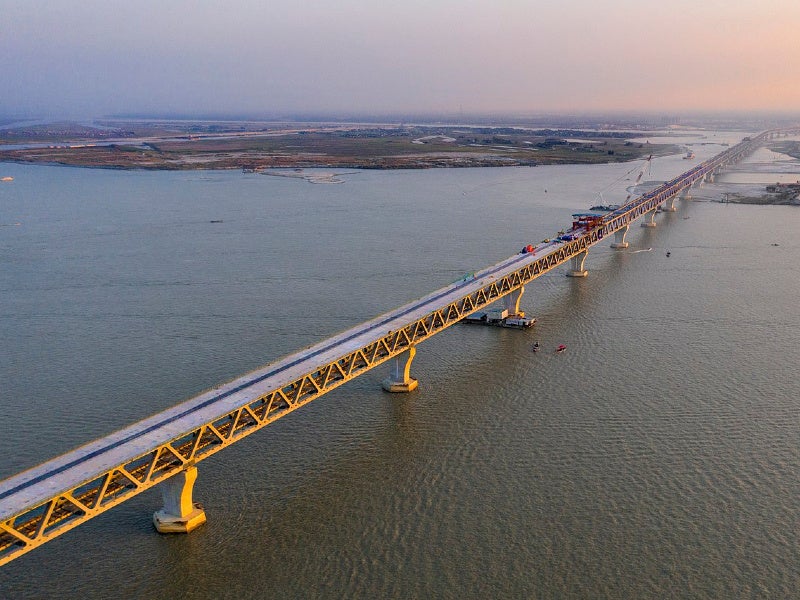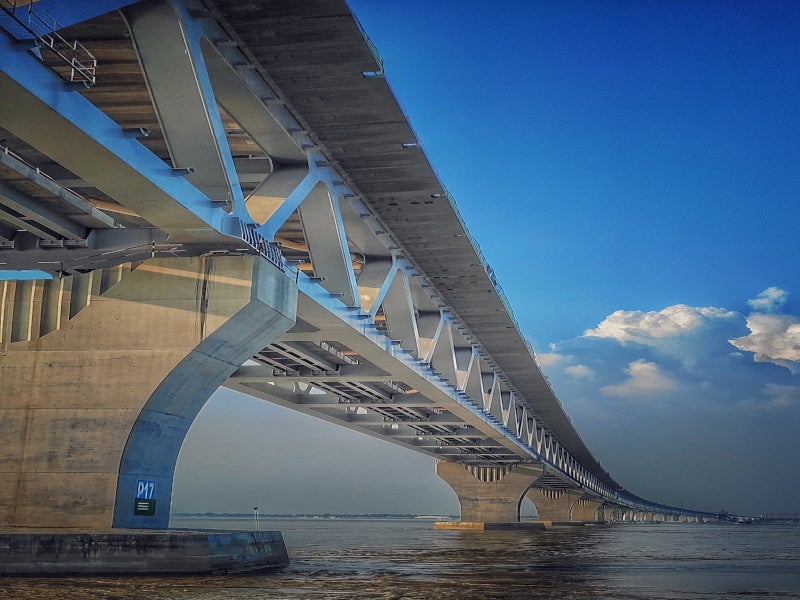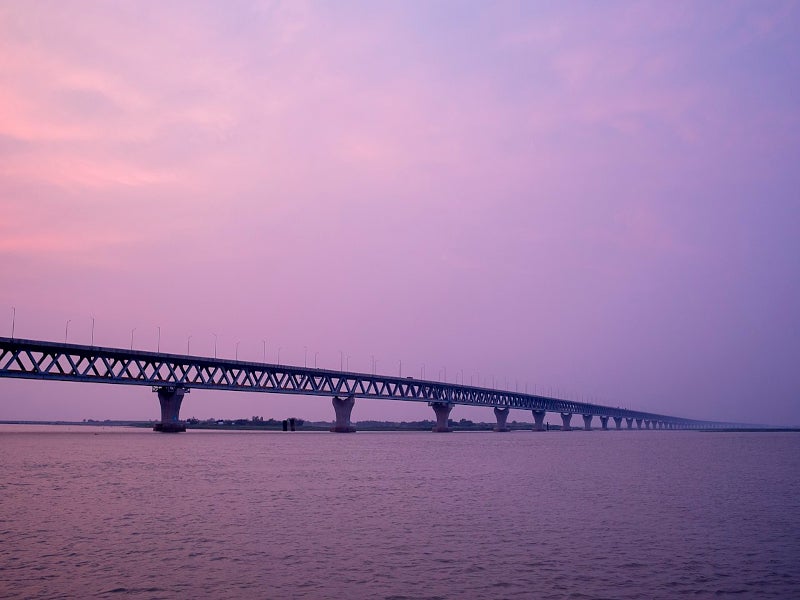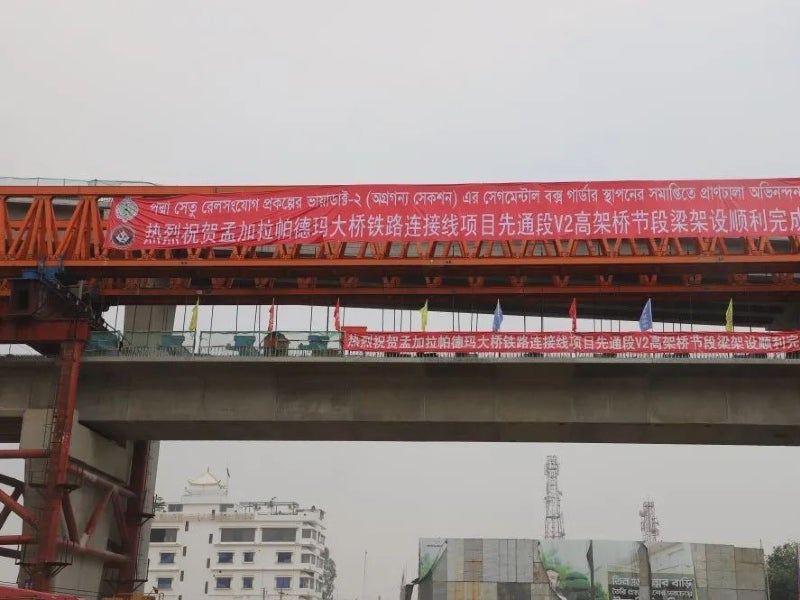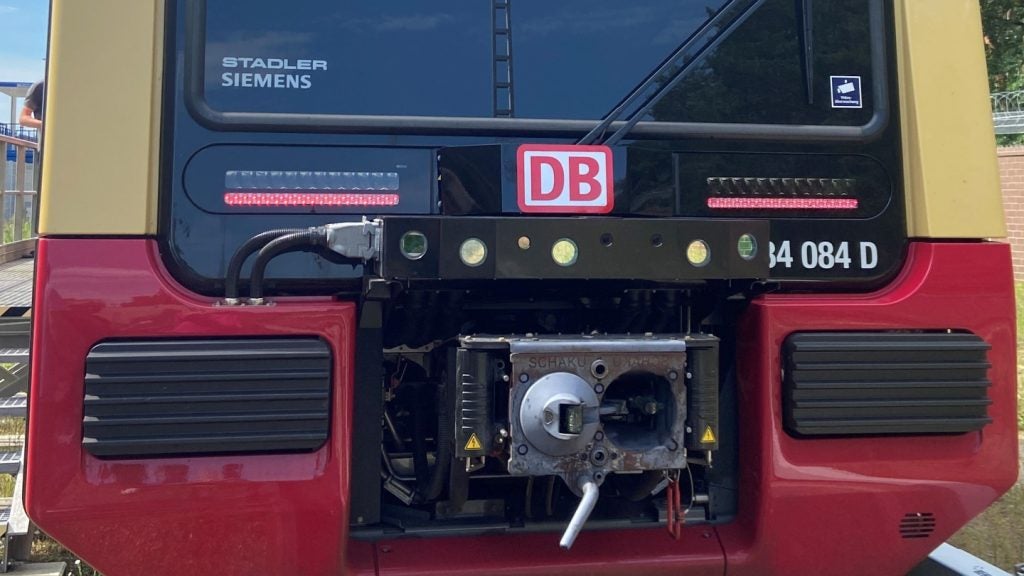The Padma Bridge Rail Link Project (PBRLP) is a new 170km-long railway link being built to connect Bangladesh’s capital, Dhaka, to Jashore, a major city in the country’s southwest region.
The state-owned rail transport agency Bangladesh Railway is developing the project with China Railway Engineering (CREC), a construction company based in China.
The rail link will pass through the 6.1km-long multi-purpose Padma bridge built across the Padma River, Bangladesh’s largest bridge and the first fixed river crossing for road transportation.
The Bangladesh government approved the PBRLP in March 2016. The main construction work on the railway project started in July 2018.
The construction of the main bridge began in November 2014 and was opened to the public in June 2022. Trial operations on the railway line commenced in April 2023. The project’s first batch of 100 passenger coaches were delivered in July 2023.
Scheduled to be completed in June 2024, the rail link will connect Dhaka to more than 20 districts, including Munshiganj, Shariatpur, Madaripur and Narail and reduce the travel time to southwest Bangladesh by several hours.
Padma bridge rail link route and design details
The 170km rail link comprises four sections: the 3km link between Dhaka and Gandaria, the 37km-long Gandaria-Mawa section, the 42km-long Mawa-Bhanga section and the 87km-long Bhanga Junction-Jessore section. The project also includes 43.2km of loop and siding line, bringing the total track length to 215.2km.
PBRLP involves the acquisition of 1,796 acres of land and the construction of 66 major bridges, including the 6.1km-long Padma bridge, 244 minor bridges, one underpass and 29 level crossings along the route. The total length of bridges along the route will be more than 30km while the total length of viaducts will be 23.7km.
The Padma bridge, which falls within the Mawa-Bhanga section of the rail link project, will connect Mawa to the existing network of the western zone of Bangladesh Railway through the Bhanga-Faridpur-Pachuria-Rajbari rail line.
The rail link project also includes the construction of 14 new station buildings, the remodelling of six existing station buildings and the installation of computer-based railway relay interlocked signalling and telecommunications systems for 20 stations.
Carriages details
The broad-gauge carriages for the project have been designed to suit the country’s natural environment and train operations. They adopt a 1,676mm gauge and have a design speed of 120km/h.
New technologies such as built-in side doors, roof water injection and split large ventilation louvers have been implemented to reduce energy consumption and make the carriages more environmentally friendly.
The layout and interior of the broad-gauge carriages integrate cultural elements of Bangladesh, aligning with local aesthetic preferences.
Padma multi-purpose bridge details
The 6.1km-long and 21.1m-wide Padma bridge offers four lanes for road transportation on the top deck and a broad-gauge single railway track on the bottom deck. It comprises 41 spans, each 150m long and 41 piers, each supported by six 128 metre-long and 3m diameter steel tube piles.
Utilities passing through the bridge will include a gas pipeline, a power transmission line and an optic-fibre cable.
Financing details of the Padma bridge rail link project
China is financing 85% of the project cost while the remaining 15% will be borne by the Government of Bangladesh.
The Economic Relations Division (ERD) of the Ministry of Finance of the Government of Bangladesh signed a $2.67bn loan agreement with the China Exim Bank for the project in April 2018.
The commercial contract value of the project is $3.13bn, of which China will provide $2.67bn (85%) as preferential buyer’s credit and the Government of Bangladesh will invest the remaining $470.81m (15%) in the project.
Contractors involved
CREC and 12 of its subsidiaries are engaged in the construction of the PBRLP.
CREC contracted CRRC Tangshan, a rolling stock manufacturer in China, to supply 100 broad-gauge passenger carriages, along with their spares and related services, for the project in May 2021.
China Major Bridge Engineering, a subsidiary of CREC, was contracted for the construction of the Padma multi-purpose bridge.
AECOM, a professional and engineering services company based in the US, provided the design of the Padma bridge, which was certified and finalised by Flint & Neill UK (now COWI).
Ringtech, a construction contractor based in Bangladesh, was subcontracted by CREC to complete the project’s remaining bridges, culverts and underpass in 2020.
The Corps of Engineers of the Bangladesh Army was appointed as the construction supervision consultant for the project in January 2017.
Professional services firm SMEC and its wholly-owned subsidiary ACE Consultants, a consulting services provider, were contracted by the Corps of Engineers of Bangladesh Army to provide construction supervision consultancy services for the Padma Bridge rail link project in July 2017.
DORP worked as an implementing NGO for resettlement activities under the supervision of the Construction Supervision Consultant (CSC Cell), Corps of Engineers, Bangladesh Army.
Bashundhara Cement, a Bangladeshi conglomerate Bashundhara Group subsidiary, secured a contract from CREC in May 2019 to supply 700,000t of cement for the project’s construction.
Strategi Consulting provided construction supervision services for the project, including property acquisition, resettlement plans, clearing rights, utility relocation, contractor review, technical support and safety assurance.
SIMEX, a construction company based in Bangladesh, built a 3,000m2 steel pile drive for the project in 30 days, using sheet piles and H/I beams.
Other contractors involved in the project are construction engineering company Hifab International, project management company SSF International, rock bolt manufacturer Sinorock and landscape company Garden Centre.
Benefits of the Padma bridge rail link project
The rail link will reduce the travel time between Dhaka and Jessore from ten hours to only two hours once operational. The alternate route provided by the project will be 212km shorter than the existing Dhaka-Jessore-Khulna railway line.

